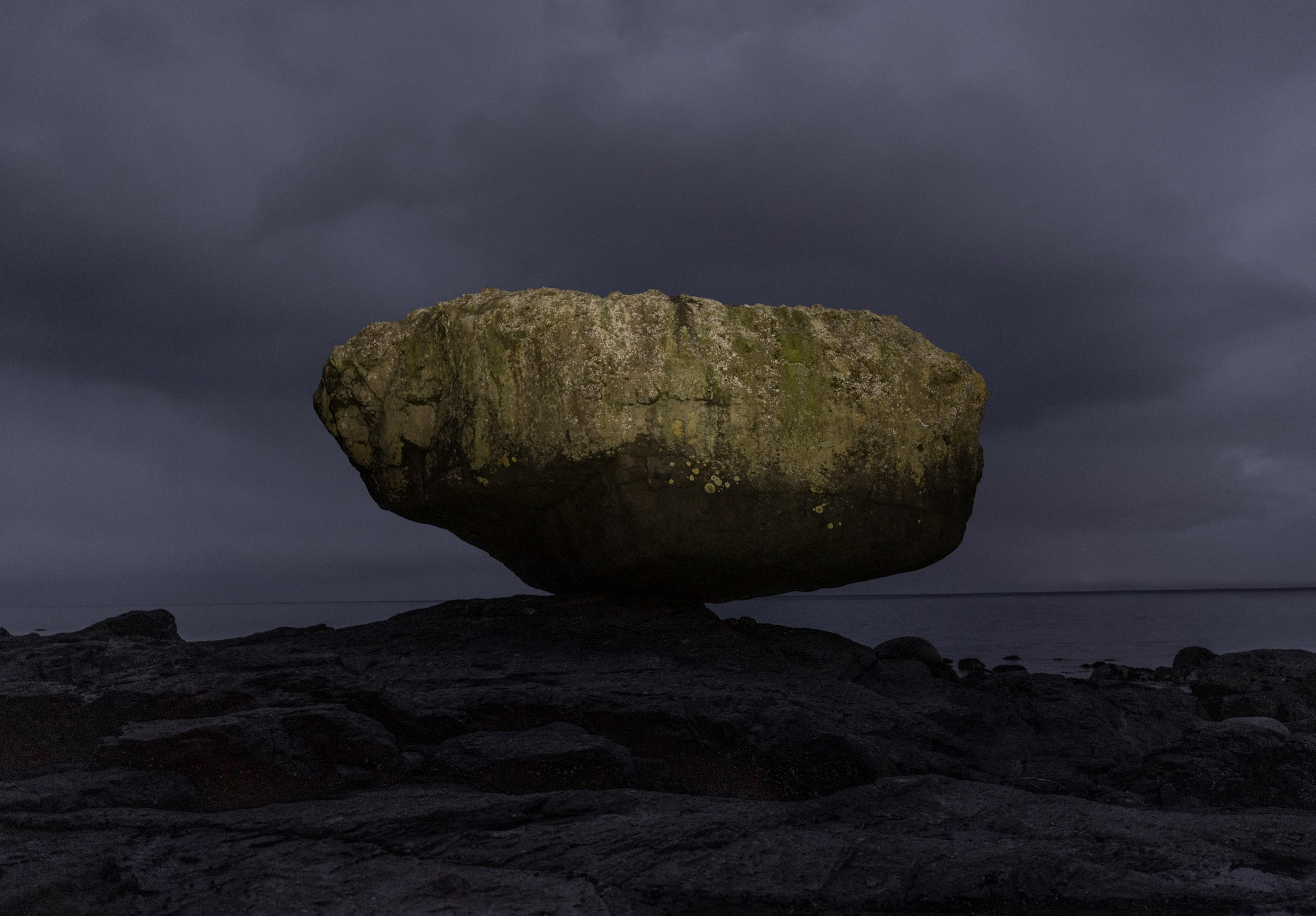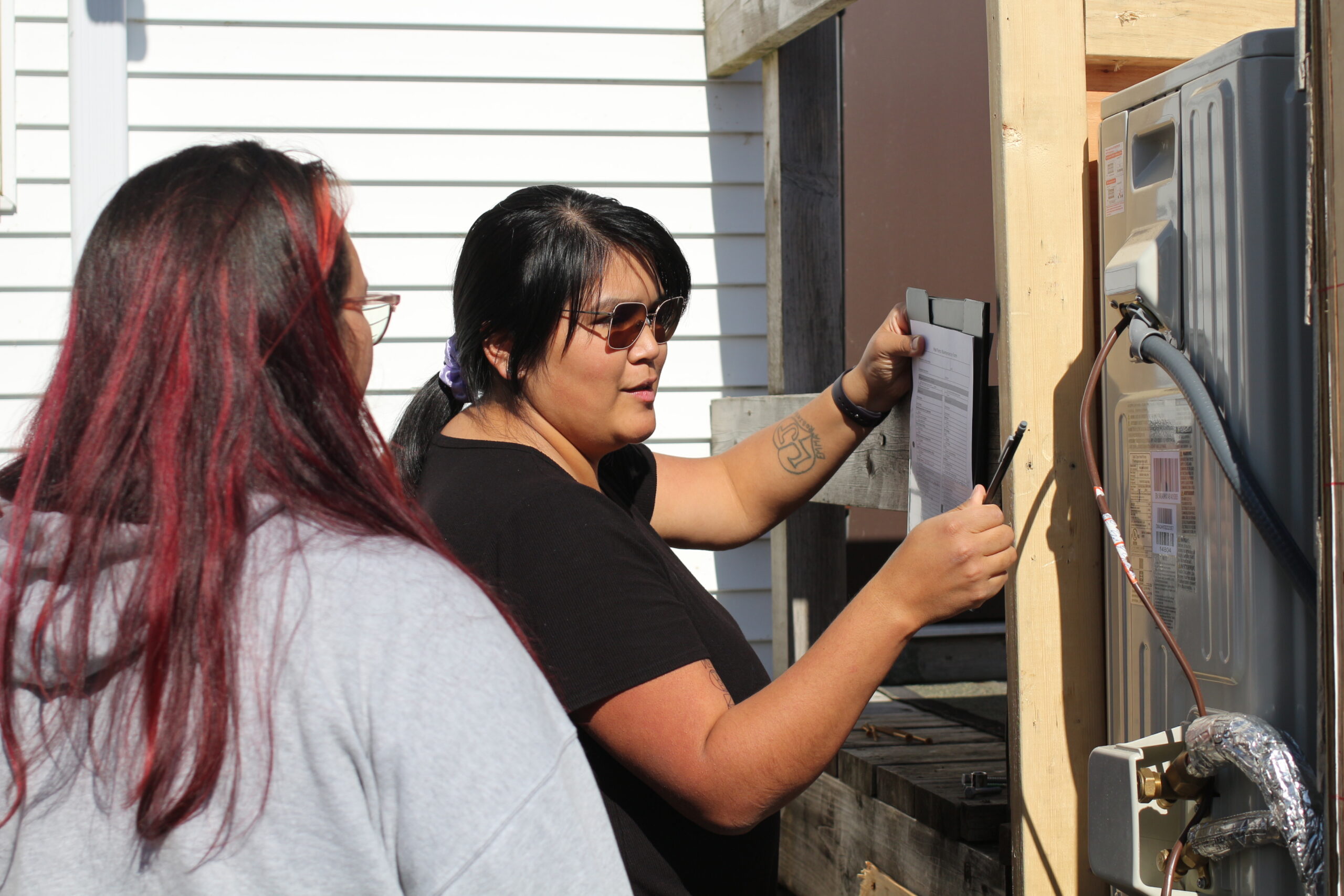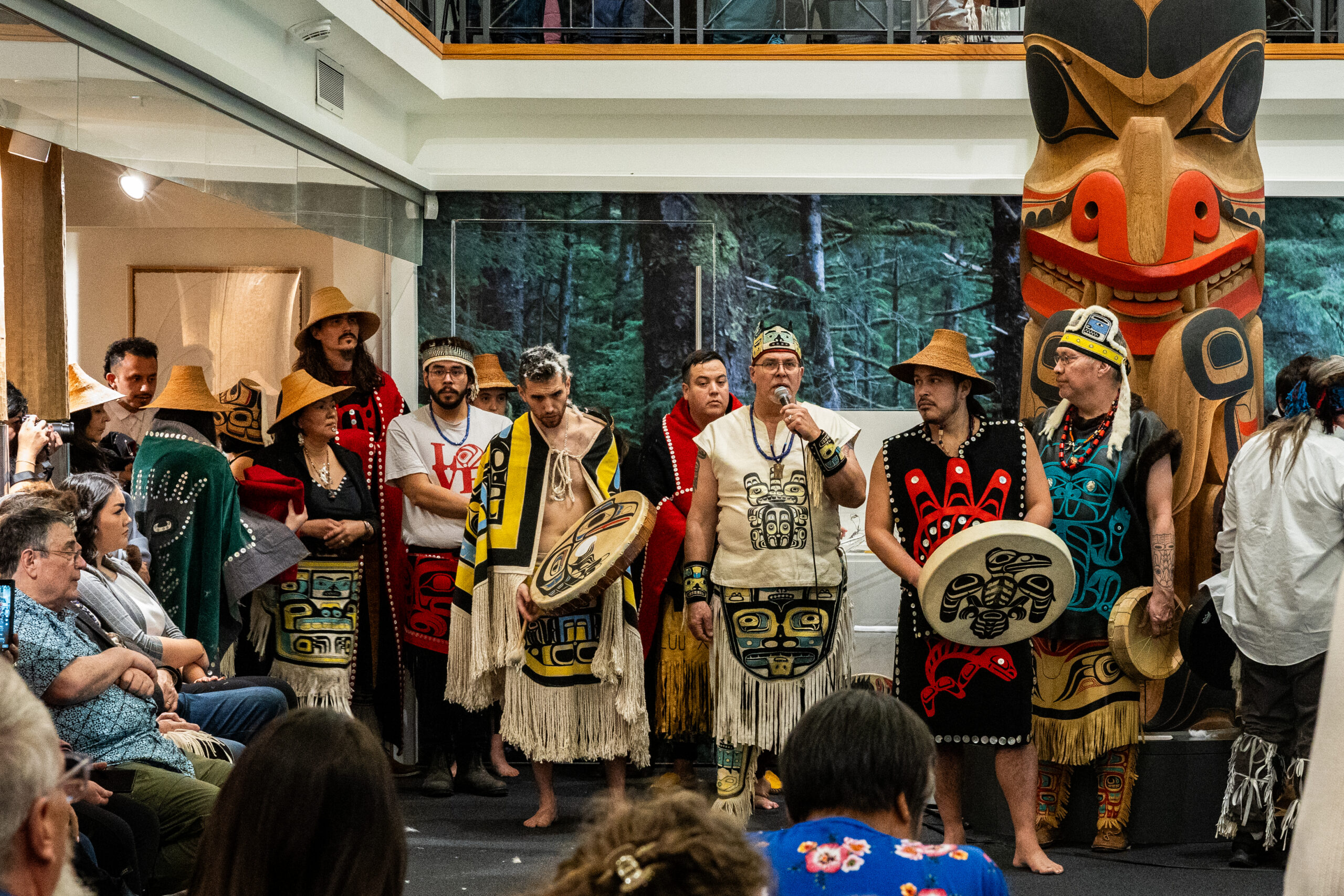Haida Elder GwaaG̱anad, Diane Brown, sits in a busy room on the first floor of the BC Legislative Assembly, as a delegation of Haida people, ministers, and staff mill about and chat around, preparing for the first reading of a historic new Bill.
“In the beginning, Creator put us here,” GwaaG̱anad says, her voice quiet and clear amidst the noise around her. She was recounting part of a story that would take an hour and a half to fully share, taught to her by one of her teachers, Nang King.aay ‘uwans, James Young. “The loon was the first to fly up to him. To ask for land.”
GwaaG̱anad speaks about the supernatural loon, who transformed into a human, to enter the Creator’s house and ask for land, not only for itself, but for other humans, animals and beings. It’s a story known to many Haida people, one she knows by heart, and importantly, one that’s fresh on her mind, as she sits in British Columbia’s grandiose parliament building, preparing, yet again, to make history with her Nation.
GwaaG̱anad shares another story, told to her by one of her old Chiefs.
“When we did get the land, we’ve been on it three times. The first time, we came out of the air, the second time, we came out of the Earth and we disappeared again, and this third time, we came out of the ocean. We have one more time, but it doesn’t say how we’re going to get here,” she says.
“The first time we came out, we were scared and cold. Eventually, we came and settled. After the trees came, we could build houses, before that it was caves… Supernaturals showed us how to make Longhouses, totem poles and we were kind of settled, taking a breath, looking around. Our old Chief said people started to look around and realize where we were in this beautiful land, with food everywhere. ‘Creator put us here, how are we going to keep it the way it is?’”
GwaaG̱anad speaks about an ancient meeting those people at the time had on one of their mountains, “the Moresby Island side,” she says, where they discussed how they were going to keep Haida Gwaii beautiful and clean, how they couldn’t take too much of anything, just enough.
“Ever since that meeting, it’s every Haida’s legacy to take care of Haida Gwaii. We’ve done OK… the first explorers didn’t know where we were, because our villages blended in with the trees…then just these last 250 years and we almost have no trees, no fish or seafood, just on the cusp of no return — then this happens, so we better take care.”
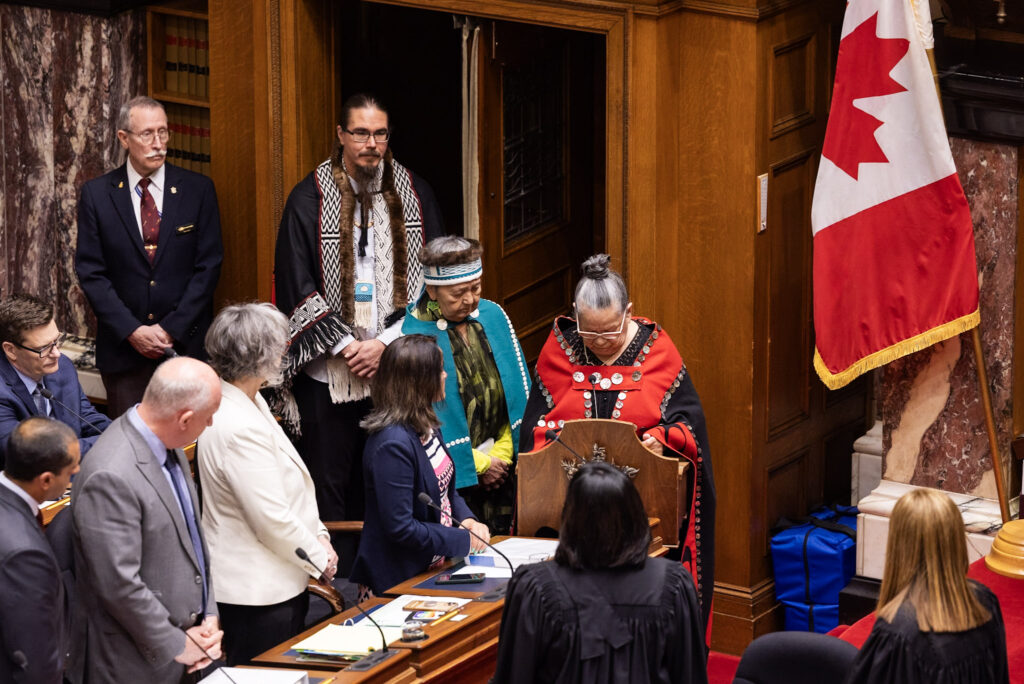
An unbroken line
GwaaG̱anad, Haida hereditary chiefs, elected leadership, community members from near and far, attended the first reading of Bill 25, The Haida Nation Recognition Amendment Act, 2024, on April 22, 2024. The new legislation amends Bill 18, the Haida Nation Recognition Act, passed into law on May 9, 2023, to recognize the Haida Nation’s Aboriginal Title to Haida Gwaii. The Gaayhllxid/Gíihlagalgang “Rising Tide” Haida Title Lands Agreement is the first time in Canadian history that Indigenous Title is recognized across all of its terrestrial territory, outside of the court system.
BC Premier David Eby says the partnership between the province and the Haida Nation is a highlight of his career.
“It’s an honour for me to be able to formally recognize this in the legislature today. This is the beginning of important work we’re doing as partners. The government of BC is making a commitment to the Haida people, while introducing this Bill, that we recognize your Title, we recognize your connection to the land, that it was never given up, it has always been.”
Premier Eby traveled to Haida Gwaii, along with Indigenous Relations and Reconciliation Minister Murray Rankin and other ministers and provincial government representatives, for the official signing of the agreement on April 14. There, he had a chance to visit the Haida Heritage Centre at Ḵay ‘Llnagaay, and learn about the Nation’s rich and ancient relationship to their place.
“I was so moved to see the artifacts from tens of thousands of years ago that demonstrate the unbroken line of the Haida and Haida Gwaii, from time immemorial,” he says. “What a remarkable history, present and future.”
The landmark Haida Title Lands Agreement is the result of generations of Haida standing up to protect their existence, their way of life, their rights and inherent title to their place. The Nation has been asserting Haida Title to Haida Gwaii in Canadian courts and tribunals for over 40 years. The Council of the Haida Nation (CHN) was formed as a national government in 1974 and ‘The Constitution of the Haida Nation’ was formally adopted in 2003, all significant stepping stones to the success of the lands Agreement.
Standing outside the legislature following the introduction of Bill 25, Kilslaay Kaajii Sding Miles Richardson, a former President of the CHN (1983-1996), says when he came on as a young leader, his peoples’ survival and cultural heritance was in question.
Our Elders pointed it out to us very eloquently and clearly. It’s not because they’re not recognizing our legal entitlements, they said, it’s because they’re destroying our life source, they’re destroying our homeland — that’s the essence of who we are as a people,” he says. “We knew at the time that if we were going to meet the basic test of survival, which every generation of our people has done, we’ve gotta get balance back into the relationship between people and place, and that became our mandate as a political body.”
To do that, they built a Constitution, he says.
“Haida law is not new. Haida law has existed ever since Haida’s have been on this Earth. It’s been a set of cultural and codified practices that have manifested our values, the things we believe, the things we aspire to, our culture has manifested those. Relationship to place has been at the core of that,” he explains. “We put those in a written Constitution and we’ve been developing it for over 30 years. Then we did a land use and marine use plan over all of our territory, all of Haida Gwaii, driven by Haida values and objectives. That’s the story of our generation of Haidas leading up to this point.”
At the core of the Constitution, has always been an articulation of continuing Haida Title, Richardson says, which is ultimately an expression of sovereignty, ownership and jurisdiction of place.
Since 2002, the CHN and the Province have been preparing for a court case on the question of Aboriginal Title on Haida Gwaii, while simultaneously trying to find solutions through their negotiations. One shared goal between the Nation and the Province has been the negotiated bilateral Agreement, which addresses Title and advances reconciliation.
The Agreement affirms the Haida Nation’s Aboriginal Title to Haida Gwaii, and sets out an “orderly process for reconciliation of jurisdictions and laws on Haida Gwaii.” In section 4 of the Agreement, the Haida Nation agrees to honour all fee simple interests, private and property rights on Haida Gwaii, which will continue under the Province’s jurisdiction, providing clarity and security for all who live on the island.
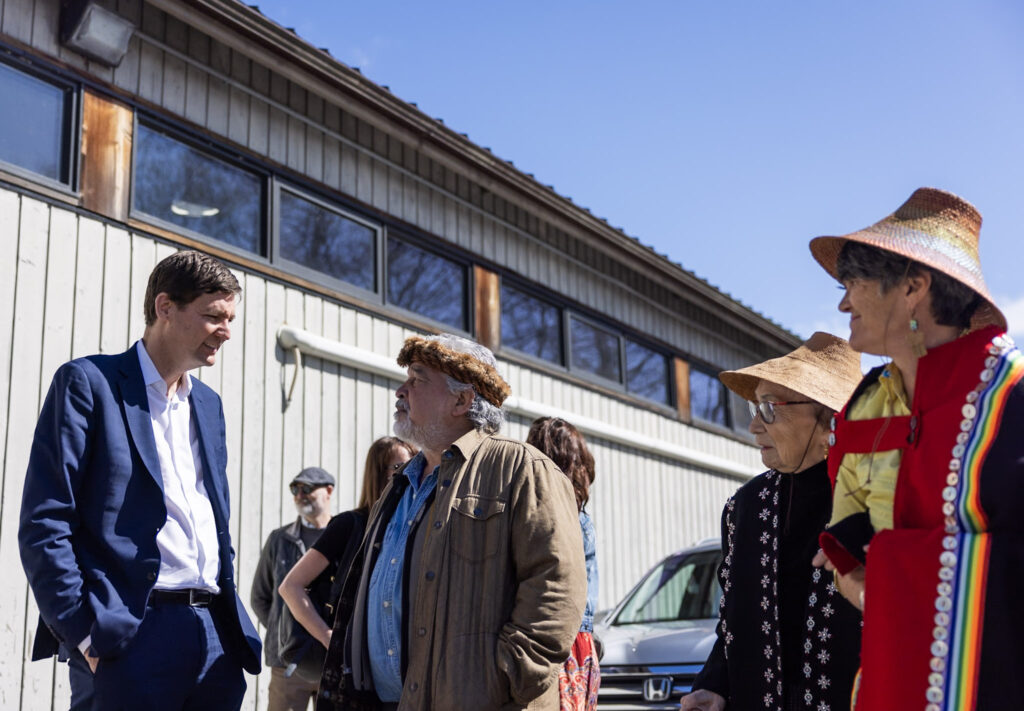
‘When they’re older, they’ll remember this day’
Elected President of the Haida Nation, Gaagwiis, Jason Alsop, says the Agreement between the Haida and the Province is about finding a way “to coexist and live together in a good way.”
“We shouldn’t take that for granted. We don’t take peace for granted… We see people all around the world right now who just want peace, to just be who they are, to be the people from that place,” Gaagwiis says during a press scrum following a speech he gave on the floor of the Legislative Assembly that Premier Eby says will go down in history.
“We’re trying to find a way forward, where we treat each other well, and have the land and the responsibility to look after the territory in the center… This legislation is about recognizing and affirming Haida Aboriginal Title to all of Haida Gwaii, that pre-existed the Crown. It’s here now, it will continue into the future. This allows us to work together, to create the space to have that full expression of Haida culture, our values, how we govern and manage the land going forward and all aspects of our society.”
GwaaG̱anad says the Rising Tide Agreement, the new legislation introduced, the steps big and small to get to where they are today, are all the result of the work of many who came before and it will benefit generations of Haida to come.
To have our voices finally heard is really an emotional thing, knowing what they’ve gone through to get here. There are many people who are no longer here, who made this happen, those who stood up to protect Lyell Island, who were first arrested to protect our lands. There are important people who couldn’t make it here today… But, I’m so thrilled our grandchildren are here today. When they’re older, they’ll remember this day.”
The message was repeated by a number of Haida delegates who brought their children and grandchildren to the Legislature, to bear witness to an event that’s significance may only form over time. Kil tlaats’gaa, Peter Lantin, a former President of the CHN (2012-2019), remembers when they formally removed the name ‘Queen Charlotte Islands’ from Haida Gwaii and what it meant for the children who grew up never knowing that name existed, he shares over the phone.
“There was this generation of kids who didn’t even know what Queen Charlotte Islands means…The next generation of Haida people, all they’ll know is a life of Haida Title. Haida Title Lands. They won’t know anything about Crown Title to our land. What does Haida Title look like ten years from now? Thinking about it from that perspective, looking backwards, I’m excited for the future,” he says, adding that, “Haida Title is alive and well in Haida Gwaii.”
“Haida Title has been alive and well for a long time. I think about all of the people who live their Haida lives, all the good work that’s been going on for so long. It’s all Haida Title. We’re doing it.”
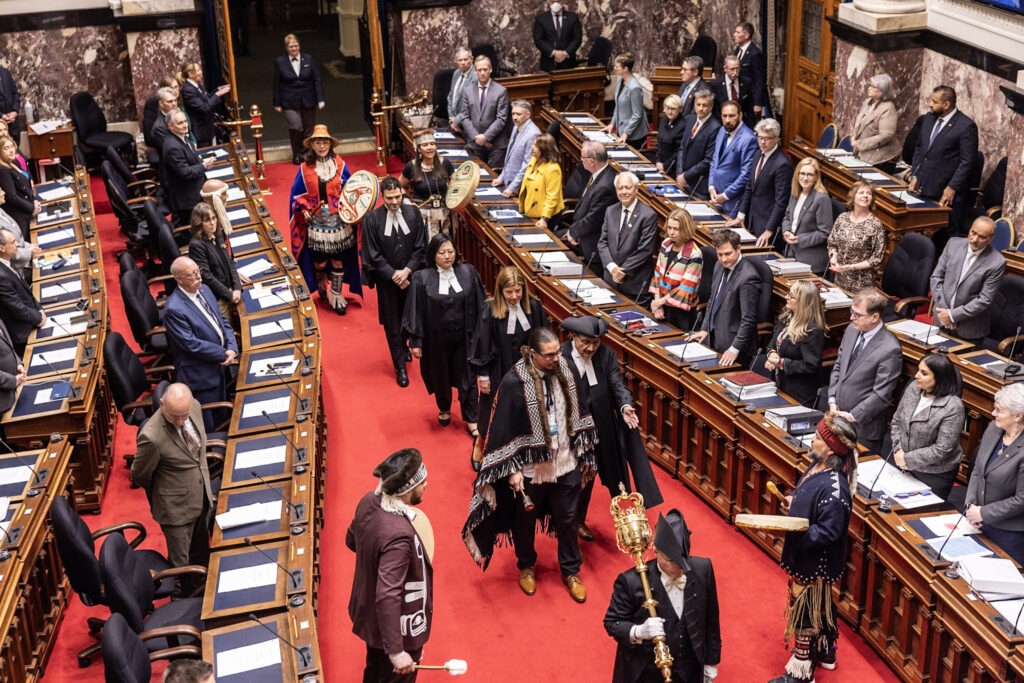
Quotes
Hereditary Chief Gaahlaay Lonnie Young
“We’re patient. It’s a relief that we’re at this point. We know there’s still a long way to go.”
Hereditary Chief Gidansda, also known as Guujaaw, a former President of the CHN (1999-2012) and Negotiator
“The land and ocean give us our life and culture… Title is responsibility. The best hope for the earth is to put it in the care of people who love it.”
Kilslaay Kaajii Sding Miles Richardson, a former President of the CHN (1983-1996)
“All we want to be is who we are. We want people to recognize that and respect that. That’s our desire, and it’s our job to accomplish that… Every Haida clan has their own story, of how they came into this world, how they ended up, right from our Creation to where we are today.”
Kil tlaats’gaa, Peter Lantin, a former President of the CHN (2012-2019)
“Who am I thinking about? For me, it’s my family. My Uncles, my mentors, our late hereditary leaders, my Naani, who was one of the Elders that stood the line at Lyell Island. At the time, she was recorded saying, ‘A lot of people think we are foolish sitting here in the rain blocking the road, but we are not, we are at this moment protecting the land, at this moment we want our island back, why doesn’t the government see it?’ And the government does see it now.”
Gam Kaayangsdla,ang, Donald (Duffy) Edgars, Elected Chief Councillor of Old Massett Village Council
“For me, it represents getting our land back for our people and our children. A lot of our Elders have passed on. This is the easy part. Our work is just getting underway. It’s a great day to be Haida.”
K̓áwáziɫ, Marilyn Slett, CFN President and Elected Chief Councillor of Heiltsuk Tribal Council
“It’s such an amazing day. It’s so wonderful to be here to support the Haida Nation. It’s something we all know, that the Haida have Title, it’s been with them for thousands of years. For the government to make that step to acknowledge it is amazing. The work they’ve put into this Agreement is obviously at the forefront of that recognition that all of our Nations are striving to see.”
Xaad xyaalaa, Christine Smith-Martin, Coastal First Nations CEO
“I brought my daughter and my granddaughter, who’s seven years old. It’s really important for her. If she doesn’t understand what’s happening now, she will when she’s older. I think back to my Naani Lavina White, she always spoke about this, about recognition, at our kitchen table. It was important for me to be here with my daughter and granddaughter — it was passed on to me, and I want to make sure to pass this on to my children and grandchildren. It’s a historic day. We’re thinking of all the Elders that aren’t here today, who worked so hard to get us to this spot.”
Puglaas, Jody Wilson-Raybould
“I’m honoured to have been invited to witness this day. The Haida have been trailblazers in terms of recognition of Indigenous rights and Title, in the courts or on the land. There’s no question that the Haida have Title to their territories, just as other Indigenous Peoples do throughout BC and across the country. It’s about time a non-Indigenous government recognized their Title, because it’s something that they can do, it’s right, and the Haida always have been and will continue to be examples for Indigenous Peoples across the country.”
Tara Cullis, Co-founder of David Suzuki Foundation
“I’m excited for the future, because I have two Haida grandsons and this is going to make a huge difference for them. I feel it makes a huge difference for the whole country. It’s an example of what can be done when we’re made to listen to a group of people with a different view. How to treat the land, who owns it, how to carry oneself on that land. It’s something Canada desperately needs and I’m so grateful so many people have made it happen and the day is taking place.”
